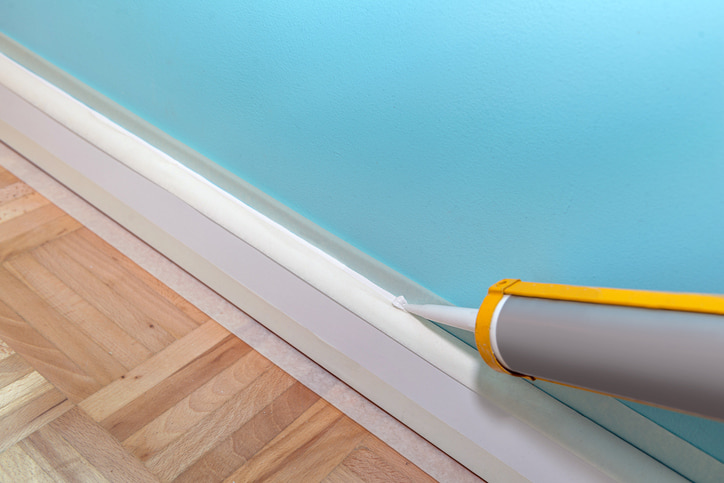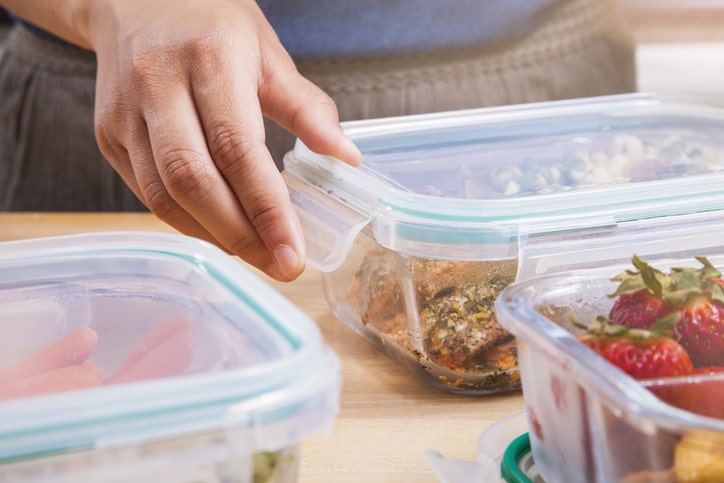As you start the process of spring cleaning, it’s also a good time to treat your home with preventive pest control treatments. As the weather gets warmer and we are more active, pests are too. We’ll walk through how to keep your home or business pest-free this spring season.
Seal Any Exterior Cracks or Crevices
One of the most common ways pests enter a home is through cracks or crevices in the structure. By sealing off any holes or gaps, you can help prevent these pests from entering your home. First, inspect your home around the baseboards, window frames, door frames, and crown molding, and take note of any signs of cracks or small holes.
For small fixes, using caulk to seal common entry points for pests can save you time and energy, and it’s affordable, too. Silicone caulking is the best option, as it’s water resistant. Before applying the caulk, be sure to clean the area thoroughly for best results. To apply the caulk, start in the corner and steadily apply the caulk along the line of the opening. Lastly, fill any gaps or smooth out any bumps with a small spoon. The caulk can take up to 24 hours to dry.
Ensure Doors and Windows Are Sealed Tight
Even though you might not spy any signs of cracks or holes leading to the exterior of your home, you want to be sure your doors and windows are able to seal tight when closed. Similar to cracks in the foundation, these are easy access points for creepy crawlers. While many people think to seal windows to keep cold air out, it’s also essential for keeping insects out. Here are a few ways to ensure your windows and doors are sealed properly:
- Use weatherstripping
- Install door sweeps
- Install window film
- Recaulk doors and windows
Frequently Take Out the Trash
As pests are constantly on the hunt for food and shelter, it’s no surprise that they’d be attracted to any trash left out. Keeping your trash sealed tight and taking it to the dumpster or trash bin frequently can help prevent pests from wandering into your home.
Store Food in a Tight Container
When storing your food away in a pantry or cabinet, it’s important to be sure it is sealed correctly to keep it fresh, and more importantly, to prevent pest infestation. Utilizing airtight Tupperware or plastic wrap in addition to Tupperware can make it difficult for pests to squeeze their way into your food.
Regularly Clean Storage Areas
While you might not think to clean out your pantry, it is vital to keeping a pest-free home. With boxes of dry food such as rice, chips, and cereal, crumbs are bound to be dropped. Neglecting these areas while cleaning can lead to pest infestation.
Clean Between Kitchen Appliances
Another place in your home that probably catches crumbs is between kitchen appliances such as the refrigerator or oven. Having crumbs sitting around your home for long periods of time is bound to lead to pests looking for their next dinner. To avoid attracting pests, be sure to add these areas to the list to vacuum and sweep when you deep clean your home.
Keep Tree Branches and Bushes Trimmed
As trees and plants come back to life during the spring season, it’s important to regularly trim your bushes and tree branches. Pests are typically attracted to unpruned leaves and tree branches as it provides them shelter. If you have a dead tree branch scraping against the side of your house, it could lead to pests crawling into your home. Trimming these dead branches can help deter pests.
Reduce Clutter
Another place pests love to hide is behind clutter, especially if there is clutter in a part of your house that isn’t visited frequently. For many pests, an ideal home is a quiet place with shelter and a food source. Organizing your personal belongings avoids clutter and allows you to keep your things off the floor, thereby removing the hiding place for pests. Plus, opening up a space makes it easier to clean.
Clean Your Home Often
Although it may be a daunting task, cleaning your home is a big step in preventing pest infestation. While not all pests discriminate against dirty or clean homes, it can certainly help reduce the chance of dealing with pest infestation. If you need to, split up the cleaning duties throughout the week instead of all at once. Frequently sweeping, vacuuming, and dusting your home will help keep pests out.
Avoid Storing Food Near the Floor
Many kitchens don’t come with a ton of storage space. When you’re dealing with limited storage space, you will probably use up every square inch of space you do have to get by. However, it is important to not store food on the bottom shelf of a pantry or directly on the floor. Keeping your food near the floor allows easy access for pests to contaminate your food. Instead, consider using a wire rack or shelf to keep your food above ground and out of reach of pests.
Keep Your Home Pest-free With Dewey Pest Control
While there are pest control remedies to do from home, most aren’t effective in the long term. You may be wondering about the best way to prevent pest infestation. With professional pest control treatments, you can enjoy peace of mind knowing your home or business will remain pest-free. At Dewey Pest Control, we utilize Integrated Pest Management solutions to remove pests from your property and prevent future infestation. Whether you’re looking for residential pest control or commercial, Dewey Pest Control has your back. Contact our team online today or give us a call for a free quote!



